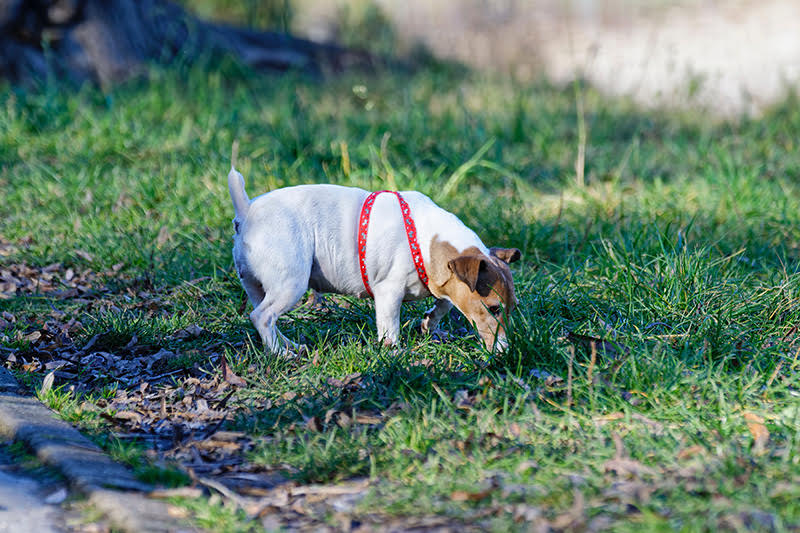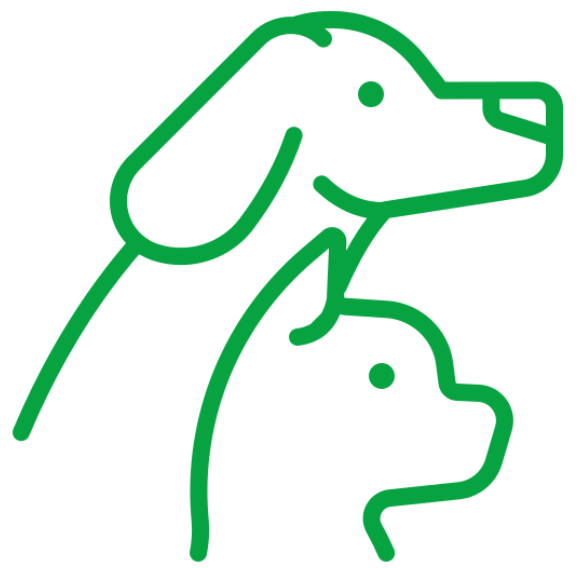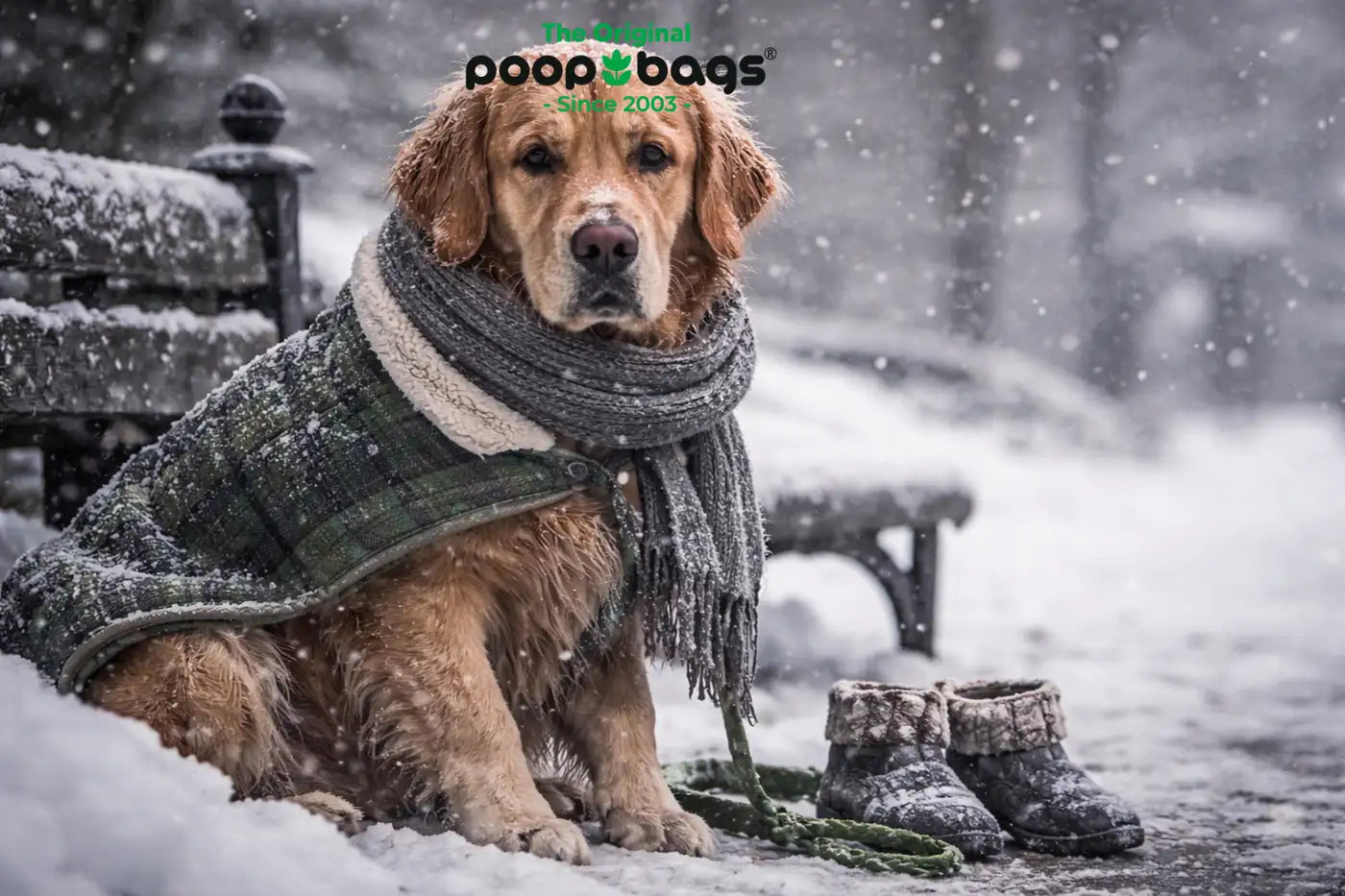If there is anything worse than constipation in humans, it has to be dog constipation.
For starters, you may not even realize that your dog has it. After all, he can't talk to you and tell you he is all backed up inside. You have to rely on body language, including the telltale squat with no results.
But then what? How can you help your dog get things moving again? Is there a surefire way to treat constipation in dogs? Find out what causes it and how you can help your dog feel better again.
When your pup does eventually get over its constipation, be sure to pick up its poop with an animal waste bag from The Original Poop Bags®. Our plant based and USDA Certified Biobased dog poop bags will break down naturally over time, and help rid the environment of animal waste which can be very toxic! Shop now for your own poop bags.
What Causes Constipation in Dogs?
Dogs and people have many things in common - one of which is the uncomfortable condition of constipation.
In fact, many of the reasons your dog gets constipated are not all that different from why you might suffer from this from time to time.
Also, like with constipation in people, dog constipation can arise from minor to serious issues.
Here are some common reasons why dogs may occasionally get constipated.
What Causes Constipation in Dogs?
One dietary issue that both dogs and people have is a lack of fiber. Many of today's processed foods, including some commercial dog foods and dog treats, just don't have enough insoluble dietary fiber to keep the feces moving.
In some cases, switching your dog to a new food (even one that is more fiber-rich) can also cause temporary constipation as the entire gastrointestinal system adjusts to the change.
Internal obstructions
If you have been a dog owner for more than five minutes, you likely already realize that many things dogs think are edible aren't really supposed to be eaten.
Dogs have a tendency to explore life with their noses and their mouths. They want to sniff and taste everything. You won't always know what your dog has been eating until it comes time to do its business and nothing comes out.
Some ingested non-edibles are more concerning than others. Dogs visit the veterinary ER every day for eating things like toy stuffing or whole toys, couch cushions, kitty litter, underwear, plastic bags, pill bottles (and their contents), and many other items.
Age
It is a well-documented fact across species that along with advancing age can come a natural slowing of the bowel function.
Even if your pup has always had timely movements, it is not abnormal to see an older dog who has become less active have the occasional bout of constipation.
Lifestyle
Adopting a sedentary lifestyle at any age can often bring with it sluggish bowels.
If a dog gets adopted by a sedentary or absent owner, even the most active canine can turn into a couch potato. Without enough physical activity each day, it may be harder for your dog to turn on their elimination system for that nightly walk.
Medications
Some medications are known to cause dogs to become constipated.
Some narcotics given for pain relief and many sulfa drugs can cause temporary constipation.
Illness
Illness isn't always physical in nature, although it certainly can be. Physical illness that limits mobility can cause constipation due to inactivity, as can cause bouts of stomach flu that temporarily disrupt the entire function of the digestive tract.
But emotional and mental illness such as separation anxiety, fearfulness, trauma, and similar conditions can also trigger a bowel shutdown, which is not unlike what happens with the human fight-or-flight response.
Disease
Sometimes constipation is one of the warning signs of a more serious underlying disease, whether localized or systemic.
Common examples in dogs can include metabolic imbalances like low thyroid function (hypothyroidism) or Cushing's disease, cancer, tumors that cause obstruction, diseases of the central nervous system or spine, joint or skeletal/orthopedic diseases, and heart problems.
Two Types of Constipation
There are two main types of constipation in dogs: regular constipation and a more severe form called obstipation.
Constipation
Constipation is considered to be a temporary or acute condition, although in some cases constipation can become recurrent or chronic.
With constipation, a dog that has generally had normal bowel function suddenly starts to have trouble defecating regularly.
What constitutes a regular bowel schedule can vary based on a number of factors as outlined above. But for most dogs, there will be a regular bowel movement one to two times per day, usually in the morning and evening.
Constipation that is temporary should resolve within one to two days with or without a little "help" as your canine veterinarian directs. Sometimes temporary constipation can go on a bit longer if your dog is recovering from surgery with general anesthesia, or must take a medication with the known side effect of constipation.
Obstipation
Obstipation is a serious form of constipation. The term is a hybrid of "obstruction" and "constipation," and refers to when the stool becomes so hard your dog can't pass it at all.
Obstipation is sometimes also called "concretion" - this term basically refers to stool that is as hard as a rock.
Obstipation occurs when the normal movement (peristalsis) in the digestive tract stalls out. Without the muscle movement that keeps everything moving through the intestines and colon and out through the rectum, the matter that needs to be expelled can literally get stuck.
The longer it is stuck inside the digestive tract, the more moisture is extracted, and the harder it gets. With too much passing of time, the matter can completely refuse to move. At this point, surgery is typically required to extract it and save the dog's life.
How to Treat Dog Constipation
Temporary constipation spares no one, regardless of species. Every being on this planet likely experiences it to some degree every now and then.
But when your dog has been struggling to pass waste matter for more than a day or two, it is time to take action before things get more serious.
There are two ways you can go from here — the first is to use any at-home aids that have worked in the past and see if that loosens things up. The second is to contact your canine veterinarian for professional guidance.
The American Kennel Club (AKC) recommends these time-honored aids that often work to end temporary canine constipation.
1. Increase the moisture content of food
Even though changing your dog's diet can sometimes trigger constipation, when constipation is the issue, sometimes a change can actually end it too.
Pumpkin puree is on the list of effective remedies for constipation in dogs, and many dog owners have had success with it. Happily, the majority of dogs love the taste of pumpkin and it is high in both moisture and dietary fiber.
Another option if your dog can't or won't eat pumpkin is to try switching to canned dog food, which often has a higher moisture content. You can also try adding some broth to your dog's normal food to give it more of a soup-like consistency.
2. Increase insoluble dietary fiber
In some cases, you may need to add more direct dietary fiber or oil/fat to your dog's food to lubricate the digestive tract and get things moving in the right direction again.
If your dog has any dietary restrictions or is on a weight-loss program, be sure to talk with your canine veterinarian before adding any foods like olive oil or coconut oil, which can put the weight on quickly.
Other options for adding dietary fiber include psyllium husks, bran, or fig paste.
Some dog owners have also found that adding a bit of fresh ginger can ease the digestive upset that often accompanies constipation in dogs.
3. Increase hydration intake
Taking in more moisture is often necessary to avoid constipation turning into obstipation and becoming serious.
If you can't get your dog to drink more water, then adding bone or vegetable broth to your dog's dinner is another great way to up the water intake.
For dogs that are dehydrated due to general anesthesia, illness, or simple unwillingness to drink water, it is important to know that dehydration can quickly become serious and impact the heart function. So talk with your canine veterinarian about adding back necessary electrolytes as well.
4. Increase exercise
It just makes sense that when your dog isn't feeling well, he probably won't be as keen to play, run, move, and walk. But this is often the time when it is most important to get (and keep) your dog moving.
Constipation often responds to physical activity when nothing else has worked. However, for dogs that have joint issues, are recovering from surgery or illness, or have just given birth, sometimes physical activity isn't a safe option.
In this case, talk with your canine veterinarian about other ways to end the temporary constipation.
When Does Canine Constipation Require a Vet Visit?
In general, when you have tried everything you can think of and everything that has worked in the past, and your dog remains blocked up, it is time to call in a pro and get your vet involved.
Specifically, when your dog has gone more than two days without a bowel movement, it is time to act. You don't want your dog to be in this uncomfortable state any longer than necessary, and you also don't want to risk constipation turning into obstipation.
It isn't always necessary to bring your dog into the vet clinic for an exam. In fact, often your vet may want you to try some additional tips at home first, to see if a fix is within reach.
But if your vet asks you to bring in your dog for a checkup, you want to head in right away.
Symptoms to Watch Out For
Here are some warning signs that indicate your dog's constipation is becoming more serious and a veterinary exam is warranted.
Blood
Whenever you see blood where normal stool should be, it is time to call your veterinarian.
Sometimes blood and liquid can be mistaken for a bowel movement when it is really a sign of obstipation forming.
Bloat
Bloat can be caused by gastric dilatation volvulus (GDV), which is a potentially fatal condition where a dog's stomach twists suddenly. Your dog can also take on a bloated (water-retaining) appearance for other reasons besides constipation.
You will likely need your veterinarian's help to determine what is causing your dog's bloated appearance, but because it can be serious, you should act when your dog starts to look bloated.
Vomiting
Sometimes vomiting can actually clear up the issue - such as when your dog may have swallowed a toy or some pillow stuffing and just needed to get it up and out.
Vomiting that is not followed by a normal bowel movement after the next meal means there may be something deeper that is amiss and it is time to consult your canine veterinarian about next steps.
Strain or Pain
Dogs don't develop hemorrhoids like people do, but they can develop anal tumors, blocked or infected anal glands, rectal prolapse where the rectum telescopes out through the anus and other serious conditions that can lead to straining and/or pain while trying to pass stool.
These types of conditions always require veterinary treatment.
By understanding what causes your dog's constipation, how to spot it and what to do to treat it, you can have your dog feeling better fast.
Be sure to shop with The Original Poop Bags® now to make sure you are ready for the time when your dog does eventually go. With our plant based bags, you will be ready for anything!






